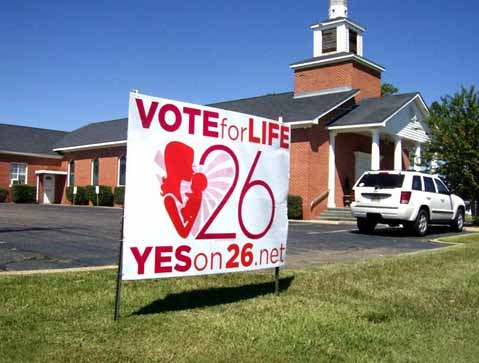
JACKSON, Miss. (BP) — After suffering disappointing losses in Colorado in 2008 and 2010, the pro-life community’s young personhood movement is on the verge of what would be a landmark victory in Mississippi to define all human life as beginning at conception.
Even though voters there will go to the polls Tuesday to elect a new governor, political and cultural observers nationwide are watching to see if Mississippians pass Initiative Measure 26, a constitutional amendment that supporters say would end abortion in Mississippi — and potentially do the same nationwide in a challenge to Roe v. Wade.
The idea is simple enough: amend the Mississippi constitution to define all life as beginning at conception, which would, supporters say, protect the unborn. The proposed 21-word amendment states: “The term ‘person’ or ‘persons’ shall include every human being from the moment of fertilization, cloning or the functional equivalent thereof.” The “cloning” reference is aimed at prohibiting research cloning.
The amendment has received the expected opposition from the regional chapters of the ACLU and Planned Parenthood, but it also has split the pro-life community. Supporting it are Richard Land of the Southern Baptist Convention’s Ethics & Religious Liberty Commission, the Family Research Council, Liberty Counsel and the American Family Association. The Mississippi Baptist Convention passed a resolution backing it, and the convention’s executive director recorded a video urging people to vote for it. Yet National Right to Life and Americans United for Life — two major pro-life organizations — have remained neutral.
Colorado voters rejected a similar amendment in 2008, 73-27 percent, and in 2010, 70-30 percent. But Mississippi’s conservative nature and Christian makeup gives personhood supporters a far greater opportunity for a win.
Other states may consider personhood amendments in 2012.
“Technology, as well as public opinion, has made it crystal clear that what we have at the moment of conception is a small human being,” Family Research Council’s Ken Blackwell said on MSNBC in October. “It is not a glob of tissue … it is a human being. What we are pushing for across the country — in Ohio, in Mississippi — is legislation that recognizes the human nature of that fertilized egg.”
In Mississippi, supporters have tried to keep the issue focused on abortion and the unborn, with the Yes on 26 yard signs and stickers featuring a silhouette of a mother kissing an infant. The Yes on 26 website says that “one simple vote” on Tuesday will “end abortion in Mississippi.” Opponents, like their counterparts did in Colorado, have tried to divert attention from abortion and argue that the amendment would ban some types of birth control as well as fertility treatments.
In vitro fertilization (IVF) and birth control, Blackwell said, “are not addressed in this legislation.”
Yes on 26 officials flatly say the amendment will not ban birth control or IVF. They also say it would not ban abortions needed to save the life of the mother.
Ironically, the personhood movement got its inspiration directly from the text of the 1973 Roe v. Wade decision that legalized abortion nationwide. In his majority opinion, then-Supreme Court Justice Harry Blackmun acknowledged that if the definition of “personhood is established” to include the unborn, then the case for abortion rights “collapses” because “the fetus’ right to life would then be guaranteed specifically by the [14th] Amendment.”
Yes on 26 has posted an audio clip of the 1972 Roe v. Wade oral arguments where Justice Potter Stewart tells one of the attorneys, “The basic constitutional question, initially is, whether or not the unborn fetus is a person. That’s critical to this case is it not?”
Land, of the Southern Baptist Convention, endorsed Amendment 26 in an email to Mississippi constituents.
“I believe you’ll agree it is unjust and inaccurate to classify certain human beings as ‘non-persons,'” Land said in the email. “Amendment 26 will clarify this for the state of Mississippi and bring full legal protection to its unborn citizens.”
Mississippi Baptist Convention Executive Director Jim Futral recorded a six-minute video that is posted on the convention’s website, saying while the other elections on the ballot are important, a vote for Amendment 26 would “make the biggest difference in generations to come.” Messengers to the Mississippi Baptist Convention unanimously passed a resolution supporting Amendment 26, saying that “we believe the very soul of an individual exists from conception” and that “in recent days many, including judges and politicians, have challenged God’s authority regarding life by denying the right of those in the womb to be born.” (The complete text of the resolution follows this story.)
Mississippi Gov. Haley Barbour, a Republican who is term-limited and can’t run for re-election, said Thursday he had voted for the amendment via absentee ballot despite reservations about its impact.
The pro-life groups who have remained neutral on Amendment 26 have done so quietly, and have spoken about the issue only if approached. There are no statements about Amendment 26 featured on the websites of National Right to Life or Americans United for Life, even though both organizations believe life begins at conception. The divide is over strategy.
Clarke Forsythe, senior counsel for Americans United for Life, said AUL has remained neutral for several reasons. Some, he said, are concerned that the amendment is being promoted at a time when the Supreme Court is not ready to overturn Roe. Five of the court’s nine justices are on record as supporting Roe.
“Some are concerned about that, but I frankly don’t think it’s a direct challenge to Roe,” Forsythe told Baptist Press. “A direct challenge to Roe would be a criminal prohibition on abortion. This is not a criminal prohibition on abortion.”
It is unclear, he said, what the amendment does. He also said AUL is supportive of other pro-life proposals in Mississippi, just not this one.
“Imagine a chest of drawers, and you’ve got four drawers,” he said. “On the top drawer you’ve got the constitution. This amendment is being put in the top drawer. But the thing that affects abortion is in the bottom drawer. That’s a criminal statute.”
National Right to Life released a statement to Baptist Press saying, “National Right to Life believes the unborn child is a person. National Right to Life Political Action Committee’s strategy and focus for 2012 will be to elect a pro-life president and pro-life majorities in both the U.S. House and U.S. Senate.”
AUL and National Right to Life also remained neutral in Colorado during 2008 and 2010.
There have been no major debates between pro-lifers on the personhood strategy. Perhaps the closest to that came in November 2010, when Operation Rescue hosted an online written debate between Steven Ertelt, editor of Lifenews.com, and Keith Ashley of Personhood Kansas. Ertelt urged caution in pushing personhood amendments.
“We absolutely want abortion ended immediately, but we recognize the only way to legally protect unborn children is through the political process — a long-term proposition akin to ending slavery,” Ertelt wrote. “… [T]he amendment [in any state] will be immediately overturned in court if it is … approved and amendment supporters have done nothing to change the Supreme Court to overturn Roe and allow the amendment to stand.”
Ashley, in his rebuttal, suggested that Justice Anthony Kennedy — who is on record as supporting Roe but who also voted to uphold a partial-birth abortion ban — might vote to uphold a personhood amendment. Ashley also said that by the time the issue makes it to the Supreme Court, the court could have a different makeup and be friendlier.
“Since no one knows the future,” Ashley wrote, “stand with us in truth and have faith in the power of our God to work in the hearts of men. Let us be mindful that the risk we run in delay are the lives of the millions of children scheduled to die in the time between this very moment, the complete nullification of that dreadful decision, and the rectification of law.”
–30–
Michael Foust is associate editor of Baptist Press. Learn more about Amendment 26 online at Yeson26.net
The following resolution on Amendment 26 passed the Mississippi Baptist Convention:
WHEREAS, God told Jeremiah, “Before I formed you in the womb I knew you. Before you were born I sanctified you,” (Jeremiah 1:5-6); and
WHEREAS, God has provided the insight to research embryologists who have confirmed that life begins at the moment of fertilization; and
WHEREAS, we believe the very soul of an individual exists from conception; and
WHEREAS, in recent days many, including judges and politicians, have challenged God’s authority regarding life by denying the right of those in the womb to be born; and
WHEREAS, the Southern Baptist Convention is on record in The Baptist Faith and Message as affirming our belief that “We should speak on behalf of the unborn and contend for the sanctity of all human life from conception to natural death” and has passed resolutions in several recent conventions in support of the right to life; and
WHEREAS, God, through the writer of Proverbs said, “Open your mouth for the speechless, in the cause of all who are appointed to die,” (Proverbs 31:8); and
WHEREAS, the Constitutions of the United States of America and the State of Mississippi, in their respective Bill of Rights state, “No person shall be deprived of Life, Liberty or Property without due process of law;” and
WHEREAS, a proposed Amendment to Mississippi’s Constitution defines the term “Person” as it is used in Mississippi’s Constitution “to include every human being from the moment of fertilization, cloning, or the functional equivalent thereof;” and
WHEREAS, the Mississippi Baptist Convention is made up of individuals who believe that the right to life is one that is “endowed by our Creator” and not our government; and
WHEREAS, in our form of government, which has been called “a government of the people, by the people, for the people” the ultimate responsibility of governing rests with us, as individuals, and if we do nothing, evil will prevail; and
WHEREAS, the messengers of the One Hundred Seventy Sixth Annual Session of the Mississippi Baptist Convention acknowledge that “All have sinned and come short of the glory of God,” (Romans 3:23) and first and foremost, must show the world God’s love which He has revealed to us through the example of His one and only Son, Jesus Christ, to everyone irrespective of their belief on this issue; now
THEREFORE BE IT RESOLVED, that we, the messengers of the One Hundred Seventy Sixth Annual Session of the Mississippi Baptist Convention on Wednesday, November 2, 2011, at FBC, Jackson call on the members of the churches of the Mississippi Baptist Convention to vote “YES: on Initiative Measure No. 26 on November 8, 2011.














